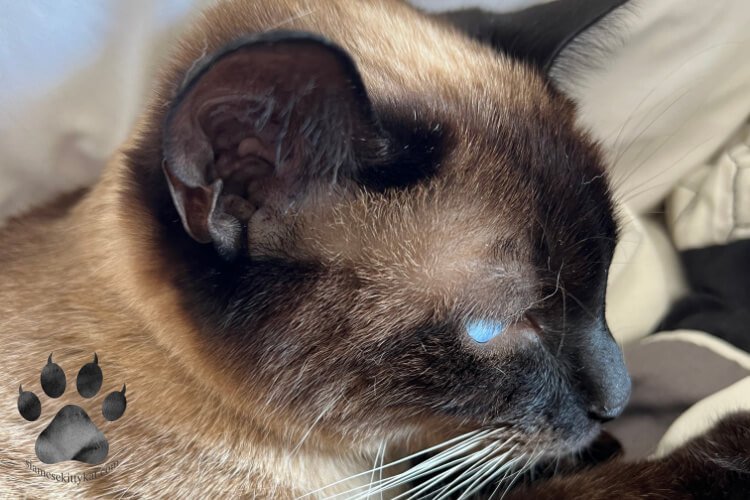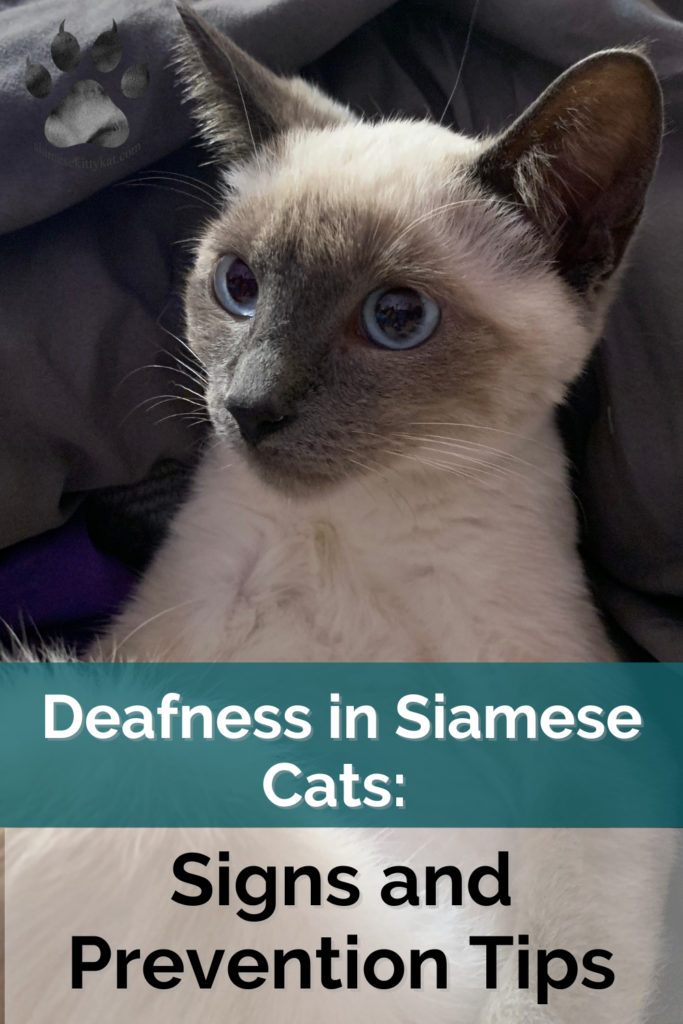One of the many well-known traits about our darling Siamese cats is that they can hear well. We should know, though, that a few factors can cause their hearing to weaken or go out.
Some kitties are born deaf, while others are prone to ear problems that can cause them to lose their hearing.
Deafness in Siamese cats is hard to detect because they often use their other senses to compensate. Knowing the early warning signs and how to keep them from happening is crucial.
We can reduce the likelihood of our kitties going deaf by taking a few easy preventative actions.
This article will discuss the signs and causes of feline deafness. I will also share with you what I have learned on how to prevent it!
What are the signs your Siamese cat is going deaf?
1. Your cat won’t stop shaking his head or scratching his ears.
2. You see dripping fluid from one or both ears.
3. There are scabs and rough skin around your cat’s ear.
4. Your cat’s ear canal is crusty or bleeding.
5. He’s meowing louder than before because he can’t hear himself.
6. Your kitty keeps meowing.
7. He is often noisy during the night.
8. Your cat stops reacting to usual cues.
9. He does not come or respond when you call his name.
10. He doesn’t react to the loud sounds near him.
11. Your kitty is sleeping longer now than he used to.
12. He is needy most of the time.
13. He doesn’t immediately notice that you got home from work.
14. Your furry pet is often easy to startle.
15. He is often disoriented.
Can you reverse deafness in cats?
Some cats are born with irreversible deafness. These cats were born with inherited congenital deafness. They are more likely to be deaf for the rest of their lives.
Other cats lose their hearing due to an ear infection or wax accumulation. They are more likely to be deaf for a short time and can hear again with the proper treatment.
What is congenital deafness in cats?
Congenital deafness is a defect that can cause partial or total hearing loss in felines.
Cats are born deaf and gain hearing after two weeks. Some white, blue-eyed cats are more likely to have partial or total deafness.
They are not albino cats. They are carriers of the unique dominant gene causing this congenital disability.
In most cases, congenital deafness happens to a cat with an all-white or white coat. You can see this often on a white Scottish Fold, Cornish Rex, Devon Rex, Turkish Angora, or Manx.
What can cause Siamese cat deafness?

1. Your cat may lose his hearing because of old age.
Age-related hearing loss is not only a common issue in people but also in felines. At around 7 to 11 years of age, some cats go deaf. This change could signify a severe illness or that they are getting older.
The most probable reason your cat may lose hearing is that he is getting old. His hearing system and nerves start to get damaged as he ages. His eardrums also get thicker when he is old, which makes it hard for him to hear.
2. Acute ear trauma can cause your kitty to go deaf.
Acute trauma to the ear can sometimes cause deafness in cats. Most ear damage in cats is caused by excessive ear scratching or engaging in kitty fights. They can get sores and inflammation from these.
Your cat can get ear trauma if they fight with other kitties often and get cut or poked. Your pet’s wounds can get infected or cause a hematoma.
Your kitty might lose his hearing if you do not treat his ears for a long time.
3. Blocked ear canals can cause acquired deafness.
Blockage in one or both ear canals can lead to acquired hearing loss. The blockage may be due to ear inflammation, wax buildup, or damaged ear bones.
Blocked ear canals can cause temporary deafness in your cat. It can happen if your pet’s outer ear canal has irritation or the middle/inner ear has a severe infection. The tiny bones in your furry friend’s ear can also get injured if there is too much earwax.
4. Overusing medications can impair your pet’s hearing.
Some medications can affect a Siamese cat’s hearing. Specifically, drugs that remove excess fluid from the body.
Examples are aspirins, antibiotics, and chemotherapy drugs.
Excessive use of these medications can have a detrimental impact on your cat’s health. It can also hurt your Siamese cat’s hearing.
5. Heavy metal exposure can damage his hearing.
Exposure to heavy metal toxins can affect a cat’s hearing.
High aluminum, chromium, and arsenic levels can harm your cat. Other heavy metals which can be dangerous to him are lead, cadmium, and mercury.
These toxins enter your Siamese cat’s body via ingesting, inhaling, or skin absorption. Heavy metal toxicity can affect his immune system, reproductive function, and hearing ability.
6. Inflammatory polyps can cause temporary deafness in your pet.
Inflammatory polyps are the most prevalent surgical problem in cats, says Blue Pearl. It is most common in kittens.
An inflammatory polyp is a growth that can happen in your cat’s middle ear. It grows through the auditory tube of your cat, called the Eustachian tube.
As this mass grows in the ear canal, it can make it hard to hear or even cause the eardrum to burst. Your cat would need surgery to remove it.
7. Loud music or noise can affect your cat’s hearing.
Loud music or noise is one of the major stressors of indoor Siamese cats. Their ears are unprepared for the sudden loud noises they can’t escape. Being in a situation outside of their usual routine is stressful.
Even worse than the stress, prolonged exposure to loud music can damage their hearing.
Your cat might lose hearing if subjected to sound with damaging volume levels. Long-term exposure to a loud sound with a frequency range of 1.0 to 16.0 kHz can cause damage to his cochlea or inner ear.
What heavy metals can impair my Siamese cat’s hearing?

These are the most common heavy metals that can impair your cat’s hearing. Watch out for these toxins:
1. Aluminum – found in insecticides and contaminated drinking water
2. Chromium – can be present in grain products, contaminated water, and dietary supplements.
3. Arsenic – found in fungicides and pesticides
4. Lead – found in plumbing equipment, plastic bottles, and some jerky treats.
5. Mercury – is present in contaminated water, as well as commercial food products.
6. Cadmium – present in fertilizers, fungicides, and plastic and metal items.
These toxins get into your cat’s body through food, medicine, and environmental poisons.
How do I prevent my Siamese cat from going deaf?
1. Clean your cat’s ears to avoid eardrum damage.
2. Check his ears and see if there’s swelling, discharge, dirt, or debris.
3. Consult your vet if your furry pet keeps scratching his ears as soon as possible.
4. Do not overuse antibiotics. Always do what the veterinarian has instructed.
5. Keep him indoors to prevent bacterial or fungal infections.
6. Clean your cat’s beddings and toys to discourage the proliferation of infectious agents.
7. Avoid playing loud music in the room where he is staying.
8. Keep the volume at a safe level if you and your furry companion listen to music.
9. Take him to the vet if he has ear injuries to determine what treatment your cat needs.
10. Do not let him come into contact with toxic chemicals or heavy metals, which can hurt his hearing.
11. Use kitty sunscreen on his pinnas to prevent cancer-causing agents and radicals.
12. Take your cat to the vet for a thorough ear examination.
Deafness is a huge disadvantage for cats. Your Siamese cat relies heavily on his hearing. It helps him stay aware of what is going on around him.
Thank you very much for taking the time to read this! I hope you found the article helpful. Knowing the warning signs and what can make a cat deaf can help keep it from happening. Following the tips makes it less likely that your cat will get a severe ear problem and lose hearing.
We gathered all the health tips tailored toward maintaining your Siamese cat’s optimal well-being. Check it out here: Siamese Cat Health: A Complete Guide
Get your FREE Siamese Cat 2025 Printable Calendar

